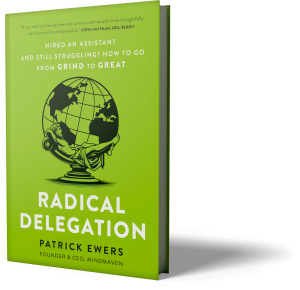Many of us can remember a time sitting in a university lecture where the topic was presented to us but we somehow didn’t really absorb the material, or worse yet, we don’t remember what was said. Traditionally, lecturing has been a more passive way of presenting information in which the audience isn’t as actively engaged in the learning process itself. When there’s a focus on core curriculum, teachers don’t always include strategies that give students power over their own learning—in effect, skills that enable people to approach any new learning situation and conquer it successfully.

In the work we do at Mindmaven, one common trait that stands out in almost all our clients is their ongoing commitment to leveraging ideas and learning new skills that will take them to the next level in whichever field they’re in. It’s easy to state that we’re committed to the ideal of learning, but we also need to make sure we’re engaging in it in the most skillful way.
This discussion is the first of a series that looks at ways you can maximize your learning process so that you assimilate information more effectively. To check out our best tips for creating structure around your learning, read our next topic here.
Step 1: Create a Learning Environment to Succeed In
The first skill I want to talk about is developing the best approach to learning. It begins with looking at ideas around how we learn better and lays the groundwork for developing a structure around it. Professor Barry Zimmerman at City University of New York did some amazing research in this area, primarily based on his students. He found that people who are learning are more actively engaged when they’re proactive and exerting control on their learning process and environment. In fact, he noticed when students set goals and monitored their self-efficacy, they boosted their achievement potential by as much as 30%.
When you actively engage in your learning process, you can boost achievement by as much as 30%. Tweet this
This is a powerful observation which applies in our professional lives too. As we go through our careers, we gradually take on greater responsibility for our own learning to reach new levels of success. For instance, the best way to establish a new habit is by developing a structure around it, but you also need to have a will and a motivation to do it, or it will not stick. Where we often drop the ball is by not having a grasp of the metacognitive skills we need in order to learn at the highest level possible.
“Metacognition” is simply a person’s beliefs around their own thinking—an awareness of what one does and doesn’t know—and an ability to control or manipulate one’s cognitive processes.
J.H. Flavell, a researcher at Stanford, summed it up well:
“I’m engaging in metacognition if I notice that I’m having more trouble learning A than B–or if it strikes me that I should double check C before accepting it as fact.”
The SRL Model
A relatively newer concept is self-regulated learning which is a dramatic way to step up our learning outcomes. Innovative in its approach, it’s been studied by Barry Zimmerman and Paul Pintrich, with its chief benefits being greater motivation, deeper retention of what’s being learned, and a greater likelihood that people will reach their goals.
As the term “self-regulated” implies, it requires that a person take an ownership role of their learning process. For example, let’s say you’ve committed to moving to Beijing to help build out the offices of a new startup company. The first thing you know is without a doubt you’re probably going to need to learn Chinese.
In the SRL model, there are three basic skill areas needed to take on this challenge:
- Identifying what the specific learning challenge is and planning it out.
- Practicing the chosen strategy and evaluating yourself by asking questions.
- Reflecting on what you learned and making ongoing adjustments that bring you ultimately to your goal.

The reason this approach is so powerful is that it closely mirrors the real world situations we come across as we take those next steps in our careers. These steps are usually ones where we need to take initiative because we’re learning something we’ve never done before. However, being intentional and forming a structure around this process is a set of skills we either lack or take for granted.
Learning is more powerful when it is intentional and mirrors real world situations that we experience. Tweet this
At Mindmaven, we fully encourage lifelong learning by teaching people how to develop metacognitive skills and be more successful at using them. Are you ready to take your learning to the next level? In our next blog, I’ll dig deeper and talk about the 3 most important skills you’ll need to make learning a breeze.
Images courtesy of Victor Habbick and Simon Howden/Freedigitalphotos.net[/fusion_builder_column][/fusion_builder_row][/fusion_builder_container]

